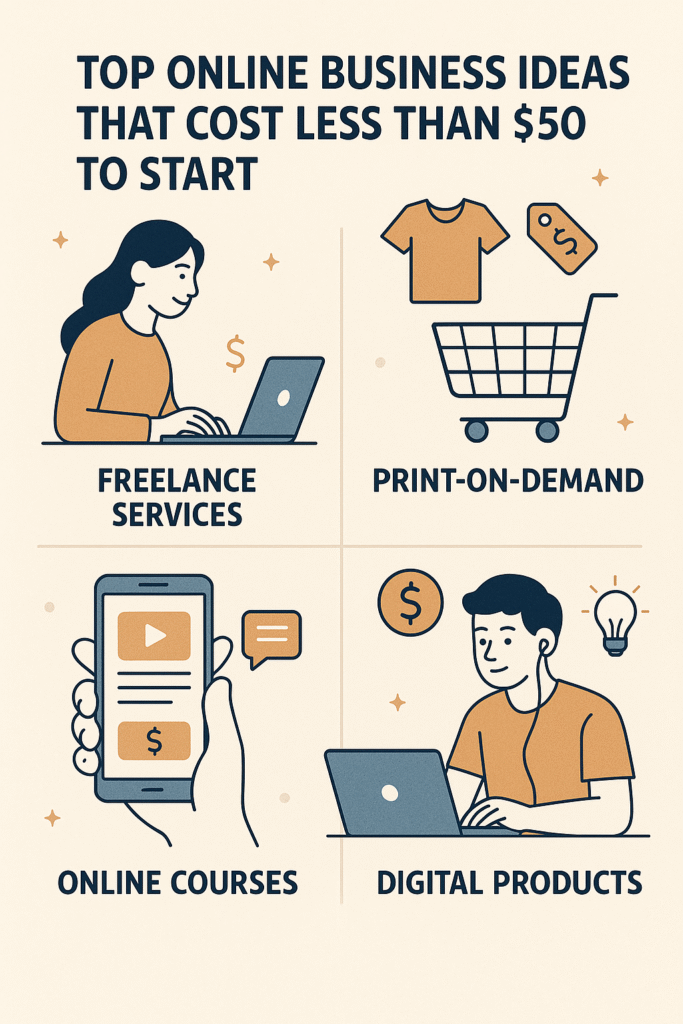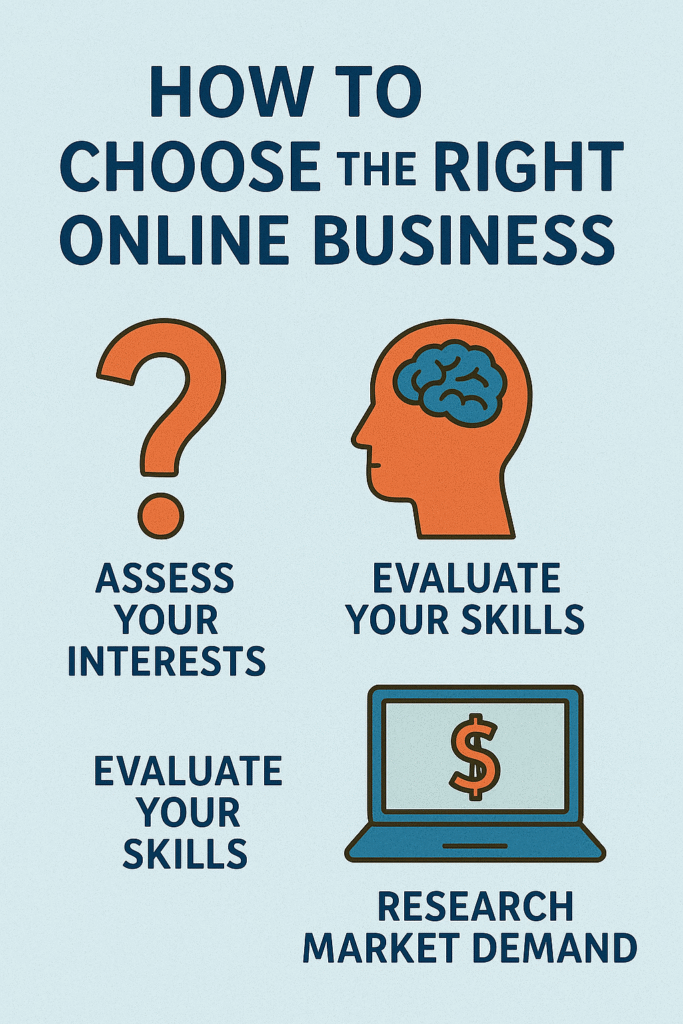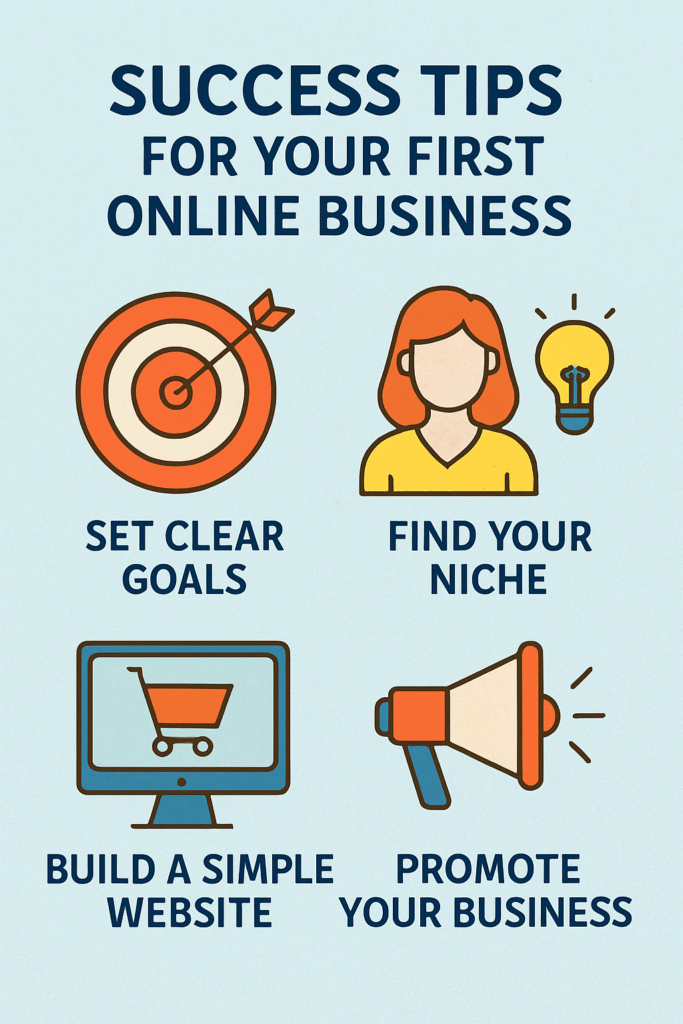Top Online Business Ideas That Cost Less Than $50 to Start and Discover
Why Start an Online Business Under $50?
Starting an online business under $50 might sound too good to be true, but thanks to modern tools and platforms, it’s more achievable than ever. Whether you’re a college student, stay-at-home parent, or someone with a 9–5 job looking to escape the rat race, a low-cost online business can be your first step toward financial freedom.
The Rise of the Online Business Model
In today’s digital age, launching an online business no longer requires a huge budget. Gone are the days of needing a physical storefront or a warehouse full of inventory. With just a laptop, internet connection, and less than $50, you can set up a legitimate business that earns income around the clock.
The flexibility and low barrier to entry make this model extremely appealing. Anyone, anywhere, can start small and scale with time and consistency.

Benefits of Starting an Online Business for Less Than $50
1. Low Risk, High Reward
Because the upfront cost is minimal, your financial risk is low. If an idea doesn’t work, you haven’t lost much—and you’ll still gain valuable experience. This is ideal for beginners who want to experiment and learn.
2. Flexibility and Freedom
Most online business models allow you to work when and where you want. That makes it perfect for busy people juggling multiple responsibilities.
3. Scalable Income
You might start small, but with the right systems in place (like automation, content creation, or affiliate marketing), your income can grow exponentially.
4. Diverse Monetization Options
From selling digital products to affiliate commissions, you have a wide range of ways to earn money online—even with minimal investment..
What You Can Get for $50 or Less
Here are a few things your $50 can realistically cover when starting an online business:
- A custom domain name (~$10–$15/year)
- Website hosting for the first month or two (~$10–$20)
- Logo design via Canva or Fiverr (~$5–$10)
- Marketing tools (many are free or offer free trials)
- Email marketing platform (e.g., MailerLite, free up to 1,000 subscribers)
With just these essentials, you can start a blog, launch a YouTube channel, sell digital products, or promote affiliate offers—all under $50.
Who Should Consider This?
- Students looking to build skills and earn extra income
- Side hustlers wanting to test business ideas without breaking the bank
- Stay-at-home parents needing flexibility
- Retirees searching for ways to stay active and earn online
- Anyone with a desire to be their own boss
Final Thoughts
Starting an online business doesn’t have to be expensive or overwhelming. With under $50 and a strong work ethic, you can start something that grows over time. The internet has leveled the playing field—your only limitation is how much effort you’re willing to put in.
This low-cost entry point is your chance to test the waters, build real-world skills, and possibly even create an income stream that supports you full-time
Top Online Business Ideas That Cost Less Than $50 to Start
Looking for the top online business ideas that cost less than $50 to start? You’re in the right place. The beauty of starting an online business today is that it doesn’t take a fortune. In fact, many powerful and profitable ideas require only a small budget—and in this guide, we’ll explore exactly those. If you’re someone who’s passionate about making money online and wants to get started without breaking the bank, these ideas will inspire you to take action.
Print-on-Demand Store
Print-on-demand (POD) is one of the easiest and cheapest online business models. You design products like t-shirts, mugs, and tote bags, and a third-party service prints and ships them when someone makes a purchase. No inventory needed!
Startup Cost: Free to ~$20 (for logo and design tools)
Best Platforms:
- Printful
- Redbubble
- Teespring
Affiliate Marketing
Affiliate marketing is one of the most profitable online business models you can start for under $50. You promote other people’s products using special links, and earn a commission for every sale made through your link. This online business model can be done via a blog, YouTube, or even social media.
Startup Cost: Free to ~$50 (domain, hosting, email tool)
Focus Keyword: This is one of the top online business ideas that cost less than $50 to start.
Top Networks:
- Amazon Associates
- ShareASale
- Impact
Freelance Services on Fiverr or Upwork
Do you have a skill like writing, graphic design, or social media management? Start offering freelance services on platforms like Fiverr and Upwork. It’s free to join and you only need a professional profile and basic samples to begin.
Startup Cost: Free to ~$30 (for portfolio tools, logos)
Tip: Use Canva (free or Pro) to create your gig images.
Start a Niche Blog
Blogging is still one of the best ways to build a long-term, sustainable online business. Pick a niche like fitness, tech, or personal finance and publish valuable content consistently. Monetize with ads, affiliate marketing, or your own products.
Startup Cost: ~$30–$50 (domain and hosting)
Focus Keyword Placement: A blog is a top online business idea that costs less than $50 to start.
Recommended Tools:
- Bluehost (Hosting)
- Rank Math (SEO plugin)
- WordPress (CMS)
Create and Sell Digital Products
Digital products such as ebooks, planners, templates, or even music beats can be created once and sold repeatedly. All you need is a good idea and the right platform to host it.
Startup Cost: $0–$50
Best Platforms:
- Gumroad
- Etsy
- Payhip
Online Course Creation
If you’re good at something, consider creating a mini-course or a full workshop. With free tools like Loom for recording and Teachable for hosting, you can start teaching others.
Startup Cost: Free to $50
Focus Keyword Use: This is another great example of a top online business idea that costs less than $50 to start.
Sell Stock Photos or Graphics
If you’re a photographer or graphic designer, turn your visuals into cash by selling them on stock platforms.
Startup Cost: Free if you already have a camera or use free tools like Canva.
Where to Sell:
- Shutterstock
- Adobe Stock
- Creative Market
Start a YouTube Channel
YouTube is a long-term game, but the monetization options are plenty: AdSense, sponsorships, affiliate links, and merch. If you’re comfortable on camera and have something to teach, this is a powerful avenue.
Startup Cost: Free to ~$50 (for mic, editing tools)
Focus Keyword: Starting a YouTube channel is definitely one of the top online business ideas that cost less than $50 to start.
Dropshipping (The Lean Way)
Dropshipping lets you sell products online without handling inventory. Use Shopify and a free theme or start on a marketplace like eBay.
Startup Cost: ~$30–$50
Tool: Oberlo (for sourcing products)
Resell Digital Products
You can legally resell digital products like PLR ebooks or templates. Find ready-to-sell packages, customize, and promote through your own store or social media.
Startup Cost: $10–$50
Where to Buy:
- IDPLR
- PLR.me
- BuyQualityPLR
Final Thoughts on Top Online Business Ideas That Cost Less Than $50 to Start
As you can see, there are many top online business ideas that cost less than $50 to start. Whether you’re interested in blogging, selling courses, or affiliate marketing, all it takes is some consistency, creativity, and a willingness to start small. The internet has leveled the playing field—meaning anyone, anywhere can start a business today.
Need help picking the right path? Check out our other posts like 15 Passive Income Ideas You Can Start in Your Spare Time and How to Start Affiliate Marketing with Zero Investment.
And if you’re ready to begin, don’t forget to bookmark this list of top online business ideas that cost less than $50 to start so you can revisit it anytime you need inspiration.
How to Choose the Right Online Business for You
Choosing the right online business can be the difference between building a sustainable income stream and facing constant frustration. With so many low-cost options available, especially those under $50, it’s crucial to align your business model with your strengths, interests, and available time.
In this section, we’ll break down the practical steps to help you choose the best online business for your lifestyle and goals.

1. Assess Your Skills and Interests
Before you jump into any online business, take inventory of your current skills, knowledge, and passions. Are you good at writing, designing, or marketing? Do you enjoy teaching, creating, or helping others?
If you choose a business that matches your natural strengths and interests, you’re more likely to stick with it—and succeed.
2. Evaluate Time Commitment
Some online business models require more time upfront (like creating a course), while others can start generating income more quickly (like affiliate marketing or selling digital products). Ask yourself:
- How many hours can I realistically dedicate per week?
- Am I looking for short-term cash flow or long-term scalability?
This helps narrow down options that fit your schedule and expectations.
3. Consider Startup Costs
Although we’re focusing on online business ideas that cost less than $50 to start, each model still has different expenses. For example:
- A print-on-demand store may require design tools or mockup software.
- Affiliate marketing often needs a domain and hosting for a blog.
- Freelancing might need portfolio-building tools.
Choose a business that fits both your budget and what you’re willing to invest over time.
4. Define Your Income Goals
Are you looking to make a few hundred dollars per month or scale to thousands? Some online businesses—like YouTube or blogging—take time to grow but can generate large, scalable income. Others, like freelancing, may offer quicker returns but are less passive.
Knowing your goals helps guide your decision.
5. Study the Market Demand
Even if you’re passionate about an idea, it needs to have a market. Use tools like Google Trends, AnswerThePublic, and niche forums to see if people are actively searching for your product or service. Look for signs like:
- Popular YouTube videos in your niche
- Existing digital products for sale
- Frequent discussions in forums or Facebook groups
6. Choose a Scalable Model
Not all online businesses are created equal when it comes to scaling. Selling your time for money (like freelancing) is harder to scale than selling a product (like an ebook or online course). If long-term growth is important to you, choose a model that can grow beyond your personal time investment.
Examples of scalable online businesses:
- Affiliate marketing
- Digital products (eBooks, templates)
- Online courses
- Print-on-demand merchandise
7. Test Before You Commit
Start small. Launch a minimal version of your business idea and test it. If it gets traction, you can double down. If not, pivot early. Most online businesses allow you to test ideas quickly and affordably.
For example:
- Write a free ebook or blog post to test audience interest.
- Launch a single product in your print-on-demand store.
- Try freelancing on one platform before expanding.
Image Suggestion: Flowchart of idea > test > validate > scale process.
Final Thoughts
Choosing the right online business doesn’t have to be overwhelming. Focus on what aligns with your skills, budget, and lifestyle goals. The best online business for you is one that you enjoy building and that meets your income expectations over time.
Use these steps to narrow down your choices, validate your idea, and confidently start a business that not only fits into your daily life—but grows with you.
Image Suggestion: Motivational quote image: “Don’t wait for opportunity. Create it.” with a laptop or digital workspace background.
Success Tips for Your First Online Business
Starting your first online business can be both exciting and overwhelming. With the right strategy and mindset, you can increase your chances of success and avoid common pitfalls. Whether you’re launching a niche blog, affiliate site, or dropshipping store, these tips will help set you on the right track from day one.

Choose the Right Online Business Model
One of the first keys to success is choosing an online business model that suits your skills, interests, and budget. Some popular low-cost options include:
- Affiliate marketing
- Selling digital products
- Starting a print-on-demand store
- Offering freelance services
Each model has pros and cons. Do your research and test what aligns best with your long-term goals.
Keep Your Costs Low and Your Goals Clear
When starting your first online business, it’s easy to fall into the trap of spending too much on tools and ads. Instead, focus on:
- Free or affordable tools (like Canva, Mailchimp, or WordPress)
- Clear short-term and long-term goals
- Bootstrapping and reinvesting your earnings
Having clarity on what success looks like—whether that’s $100/month in profit or gaining 1,000 email subscribers—keeps you focused and motivated.
Learn Before You Burn (Out)
New entrepreneurs often jump in without learning the basics of online marketing, SEO, or content creation. Use free resources like:
- Neil Patel’s Blog – SEO and marketing tutorials
- HubSpot Academy – Free online marketing courses
- YouTube channels like Income School or Ali Abdaal for passive income tips
Learning while doing will make your online business journey smoother and more rewarding.
Build an Email List Early
An email list is one of the most valuable assets of any online business. Start collecting emails from day one using free tools like:
- Mailchimp (free for up to 500 subscribers)
- MailerLite or ConvertKit for better automation
Offer a freebie like a checklist, mini eBook, or resource guide to encourage people to subscribe.
Stay Consistent and Patient
Rome wasn’t built in a day—and neither is a successful online business. Be consistent with your content, marketing, and engagement. Don’t expect instant results. Most online entrepreneurs see success after months, not weeks.
Set a realistic schedule and stick to it, whether it’s posting one blog per week, uploading two videos a month, or emailing your list twice a week.
Use Analytics to Make Smart Decisions
Track your performance from the beginning. Use free tools like:
- Google Analytics – Understand visitor behavior
- Google Search Console – Monitor SEO performance
- Hotjar – See where users click on your site
Review your analytics weekly to see what’s working and what needs improvement. Data will guide your online business growth more than guesswork ever could.
Outsource When It Makes Sense
You don’t need to do everything yourself. As your online business grows, outsourcing tasks like:
- Graphic design
- Copywriting
- Customer support
- SEO optimization
…can free up your time and help scale your operations. Use platforms like Fiverr, Upwork, or OnlineJobs.ph to find affordable talent.
Join Communities for Support and Growth
Surround yourself with like-minded people who understand the challenges of building an online business. Join Facebook groups, Reddit threads, or Discord communities. Some good ones include:
- r/Entrepreneur and r/DigitalMarketing on Reddit
- Indie Hackers community
- Smart Passive Income Community by Pat Flynn
Networking can lead to partnerships, mentorship, or new ideas you haven’t considered.
Celebrate Small Wins
Every step forward counts. Whether it’s your first sale, first email subscriber, or your first 100 website visitors—celebrate it. These milestones add up and keep you motivated.
A successful online business is built one small step at a time.
Final Thought
Launching your first online business doesn’t have to be perfect—it just has to be started. Focus on progress over perfection, keep learning, and stay consistent. Use free tools, connect with a community, and take small, actionable steps every day.
Remember, the most successful online business owners today all started somewhere—most with less than $50 and a dream
if you need further explanation contact us
read more posts by blog page
